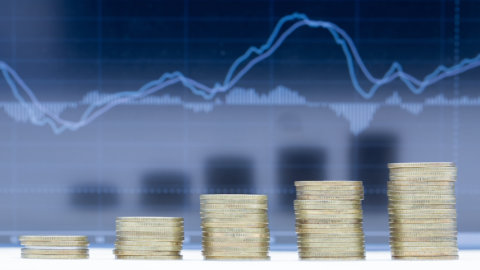The collapse of European and Wall Street stock markets has had its effects on Asian stock exchanges. The MSCI Asia Pacific index shows losses in the order of 2 per cent, the American T bonds have broken through the 2 per cent wall in Tokyo: an investment in the ten-year yields 1.97%. The Nikkei 225 index is down by 2,19%, Hong Kong's Hang Seng, just before the close, is in the red by 2,79%.
The drop in oil futures and the fall in interbank activity contribute to the worsening of the market's already bad moods: the Fed has placed the requests of European banks in the USA under observation. Asian losses are accumulating as stock market capitalization fell on Black Thursday: market capitalization fell by 300 billion euros in a single session.
The recession syndrome crumbles Wall Street
Recession syndrome. The virus that hit the euro area didn't spare the American markets, which experienced a new day of fear, as evidenced by the exceptional level of the Vix, the volatility index, and above all a couple of records: the yield on 2-year T bonds , more considered a safe haven than ever, slipped to 1951 percent, the lowest since 1.826, President Harry Truman; the price of gold reached 2 dollars an ounce, a new step towards the ceiling of XNUMX.
Meanwhile, the lists marked heavy losses: the Standard & Poor's 500 is down by 4,5%, the Dow Jones has lost more than 420 points equal to 3,7%. Worst of all the Nasdaq with a loss of 5,2%. The black shirt belongs to the Financials sector, which has left an abundant 5% on the ground.
A new series of macro data has contributed to making the risk of recession increasingly palpable: the Philadelphia Fed index, which measures the conditions of businesses in one of the most important areas of the United States, collapsed to its lowest level since March 2009, settling for month of August at -30,7, against a forecast of +2. A figure greater than zero indicates expansion in the area covering eastern Pennsylvania, southern New Jersey and Delaware. “Given the strategic weight of this region for the US economy – reads a note from Credit Suisse – it is no exaggeration to say that the recession began in the United States in August”. Meanwhile, the Labor Department has released the data on new job applications: 408.000 against the 400.000 forecast by economists. And again: 4,67 million homes were sold in July against a forecast of 4,9 million. The worst result of the last 2011 years is looming for 13.
Prices rise and GDP slows down
Finally, the most worrying figure: the 0,5% increase in producer prices in July, against a forecast of -0,2%. But the combination of rising prices and slowdown in GDP evokes the most feared specter: stagflation, the nightmare of the 19s. Faced with this specter, America is divided, starting with the Fed's control room. “For the first time in 2011 years – comments on the New York Times a manager of Federal Investors, Lawrence Creatura – the Fed is deeply divided, in communications to the market". The New York Fed chairman stressed that the US recovery in 2011 is slower than expected and that estimates for the coming months have been cut. The timid signs of employment recovery observed at the beginning of 2013 were denied as the months went by. Charles Plosser, the "hawk" of the Philadelphia Fed, speaking of Bernanke's strategy which intends to keep rates close to zero until 2011, spoke of "inappropriate choices at inappropriate times". Finally, Morgan Stanley has revised downwards its estimates of world GDP for 2012 and 7,5: the global economy is "dangerously close to recession" and the stagnation was caused by the wrong economic policies in the United States and Europe. And now fears about the situation of public debts are being resurfaced by the even more dangerous ones of the recession. In this context, the rain of sales that has hit all the lists has matured, with few exceptions. Note the loss of Bank of America (–5%) and Hewlett-Packard (-XNUMX%) on the eve of the quarterly data.
The Milan Stock Exchange still black jersey
But America has done nothing but amplify the tensions that have already exploded in the markets of the Old Continent, all in deep red. Milan and Madrid were the worst performers in Europe closing down by 6,2%, followed by Frankfurt -6%, then Paris -5,4% and London -4,6%. In short, after a brief breath of fresh air, the moments of panic of the past weeks are relived. With one not negligible difference. If in recent months it was sold because the outcome of the public debt crisis was feared, since the data showed that Germany's economic growth stopped in the second quarter, it is sold because there are bets on a freeze of all world economies, even emerging ones. The news that Angela Merkel and Nicolas Sarkozy have sent a letter to the President of the European Council, Herman Van Rompuy, in which they reiterate their intention to present the proposal to institute a tax on financial transactions by the end of September ( Tobin Tax).
Fiat, in one month lost a third of its value
In Milan, which at 12 today is down by 3%, all sectors are down without distinction. Fiat, once again, conquers the black jersey of the worst blue chip, down by 11,8% after the release of some advances on the trend of registrations in Brazil. But the crisis of industrial values, those most linked to the economic cycle, has spared no one: Fiat Industrial loses 13%, Pirelli 9,2%. The Stoxx index of European automotive companies lost 6,4%.
Meanwhile, the decline of oil and utilities continues. Eni lost 4,8%, Saipem 6,6%, while WTI-type oil trades at 83,5 dollars a barrel (-5%). Sales also on utilities: Enel -5,4%, Snam Rete Gas -3,5%, Terna -1,8%.
Deep red for the banking system, despite the ban on short selling. Rumors about the crisis of Société Générale are spreading again on the markets but the finances of the City are also in the crosshairs. In Italy, sales affected all banks: Bpm -7,4%, Unicredit -7,4%, Intesa Sanpaolo -9,2%. For once, this is not an Italian case given that the Stoxx index of European banks loses 6,2%: the Wall Street Journal reports that the New York Federal Reserve has raised the level of surveillance on the branches of active European banks in the United States as he fears that a liquidity crisis could occur. New York Fed chairman William Dudley responded to the rumors by stating that the central bank is looking at all banks the same way. The news that the ECB has financed an important credit institution with 500 million which has collided with the sudden withdrawal of its US counterparts has certainly not erased the fears. Finally, in the Midex, Indesit closed with a drop of 11,1%: Goldman Sachs cut the target price to 7 euros from 9,4 euros.





